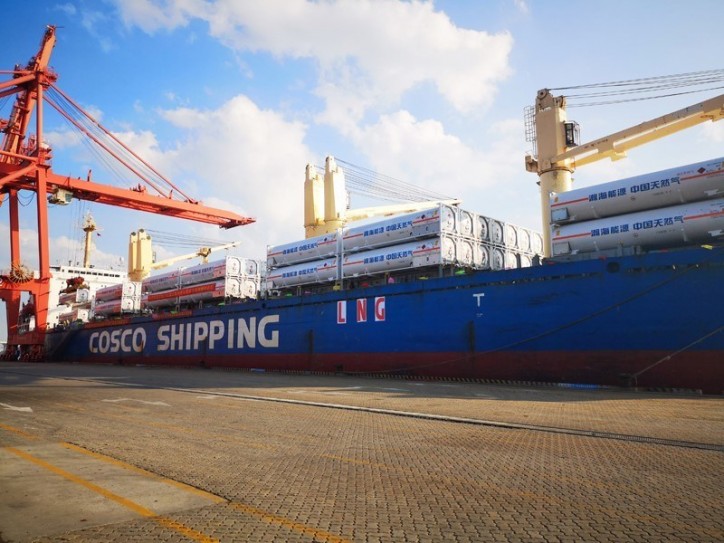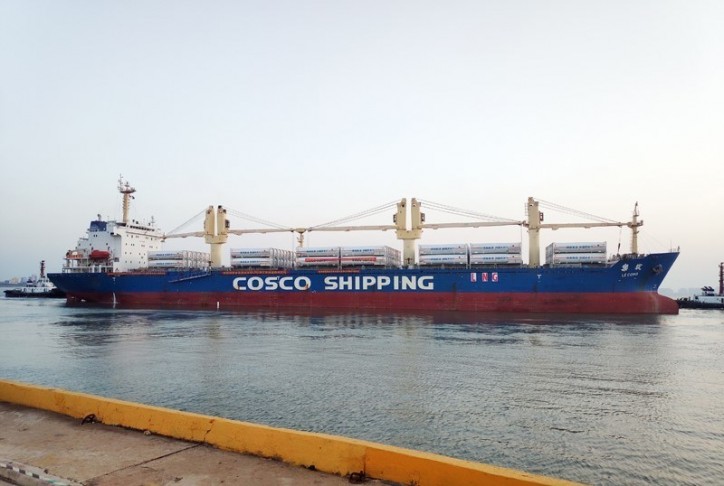A feeder container ship loaded with 130 LNG tank containers sailed northward from the Port of Yangpu of Hainan Province to the Port of Jinzhou in November. The innovative transportation of liquefied natural gas (LNG), a trial project jointly approved by China's National Development and Reform Commission (NDRC), National Energy Administration (NEA) and Ministry of Transport (MOT), is the country's first-ever attempt to transport the surplus capacity of Hainan terminal to its northern part via LNG tank containers, and it is of significant importance to satisfy the demands for winter heating with clean energy and ensure the LNG supply in northern China.

It is noteworthy that the 130 LNG tank containers were developed and manufactured by CIMC ENRIC.
China is fully committed to the construction of a natural gas production, supply, storage and marketing system
The tighter availability of natural gas faced by a large part of China last winter and this spring has fully revealed the country's lack of natural gas storage ability, and the problem will become even worse owing to China's rising demand for natural gas. So far, the escalating conflict between supply and demand has greatly restrained sustainable development of the domestic natural gas industry.
China has seen an explosive growth of natural gas consumption over the years, and it is challenging to meet the country's demand for natural gas, especially in the heating season. Amidst the widening supply-demand gap, LNG has become a major method for natural gas.
According to Wood Mackenzie, China's LNG imports are forecast at nearly 50 million metric tons in 2018, an increase of 12 million tons over 2017.
The International Energy Agency (IEA) indicated in Gas 2018- the latest IEA annual market report that by 2019, Chinawill become the world's largest importer of natural gas, and by 2023, it will import 171 billion cubic meters of natural gas, with LNG accounting for more than 50 percent of the total imports.
In recent years, the Chinese government has been accelerating construction of the natural gas production, supply, storage and marketing system to meet its rising demands for natural gas and alleviate growing natural gas shortages.

In April 2018, the NDRC and the NEA jointly issued the "Opinion on Accelerating the Construction of Gas Storage Facilities" and "Improving the Market Mechanism on the Supportive Services of Gas Storage and Peak Load Adjustment", stating that the improvement of gas storage and peak shaving ability is an important part of promoting the construction of the natural gas production, supply, storage and marketing system, and calling for the construction of a multi-tiered gas storage and peak shaving system based on interlinked pipe networks, with underground gas storage reservoir and coastal LNG terminals serving as the major part, centralized and large-size LNG storage tanks in key inland areas as the minor part, and gas field peak load adjustment, interruptible provision, alternative energy and other adjustment means as the supportive part.
"Previously, LNG was merely used for the purpose of peak load adjustment in China; today, it is considered as one of major gas sources due to the tighter natural gas supply. And this is good. However, most of the LNG infrastructure with terminal stations as the core is distributed in the southern part of China, such as Hainan Province, Shenzhen Municipality and Guangxi Zhuang Autonomous Region. This can only help a little in alleviating natural gas shortages in the heating season in the country's northern part. Therefore, the south-to-north natural gas transportation means a lot for China and it is a strategically important link in building the natural gas production, supply, storage and marketing system," said Yongsheng Xu, General Manager of Nantong CIMC Energy Equipment CO., LTD.
CIMC's ship tank container proves be the best match for LNG transportation
To transport natural gas from south-to-north, there are two options: the commonly used pipelines and the popular non-pipeline model from the central and western parts of China.
"Though the existing pipelines and tank cars have played important roles in south-to-north natural gas transportation, they cannot yet fully handle the surplus capacity of terminals in the southern part of China. In this case, persistent efforts must be done to innovate natural gas transportation models and further promote the building of the natural gas production, supply, storage and marketing system," said Yongsheng Xu of CIMC ENRIC. "The transportation of LNG via tank containers is an innovative way and effective supplement to natural gas transportation. It is flexible, quick and a low-cost investment with short-term gains. Once the rail-sea-road-rail transport achieves significant breakthroughs, it will have more potential."
Well-suited for storage and transportation, the 130 LNG tank containers produced by CIMC ENRIC have successfully transported the large volume of surplus natural gas from south-to-north via ships, with the gasification capacity of a single tank container reaching 25,000 cubic meters.
As a standardized carrier, the LNG tank container enjoys unique advantages in the whole industrial chain of natural gas, which is an optimization and supplement of the traditional industrial chain and becomes a new measure for securing winter gas supply in China. Large-scale LNG transportation is characterized by large volume, extensive coverage, flexibility, safety, low-cost investment, short-term gains, etc. Once such intermodal transport works on a large scale and gets widely commercialized, it will extend to inland markets and exert far-reaching influence on the LNG industry.
"In terms of safety, multiple tests by professional testing agencies have proved that our LNG tank containers have a solid and reliable structure. They will not damage liquid commodities inside and will prolong the storage life of the commodities. At the same time, CIMC ENRIC has specially installed intelligent monitoring devices in each tank container, so as to ensure the real-time monitoring of liquid level, temperature and location of the tank container during stacking, loading and unloading and transporting. By doing so, the safety through the entire transportation process has been tremendously improved," stated Yongsheng Xu.
In addition, with its larger application scope and stronger adaptability performance, the new LNG tank container transportation model can be further extended to railway, road and water transportation; achieve the door-to-door supply from terminals to users and deliver natural gas to areas not covered by existing pipe networks; further improve the country's natural gas storage and supply capacity; and become a method vital for national well-being, the people's livelihood and the country's energy security.
CIMC is proud of its best-of the-class LNG tank container technology and optimistic about the market prospects
"There is no doubt that the south-to-north natural gas transportation and intermodal transportation via tank containers will create a new business operating model in the LNG supply chain for the whole market, as our clients and we both believe that China is taking steps to make the transportation of LNG via tank containers as one of important approaches to ensure the successful supply of natural gas in the heating season," said Yongsheng Xu, "it is the great confidence in the forthcoming market boom that drives China LNG Group to place bulk orders on LNG tank containers with us."
"The first-ever successful transportation of LNG via ship tank containers has demonstrated CIMC ENRIC's exceptional competence in product R&D and service provision, and it will make great contributions toward having a sufficient natural gas supply in northern China," said Yongsheng Xu. "As China continues to speed up constructing the natural gas production, supply, storage and marketing system and deepening the natural gas transmission models, CIMC's LNG tank container business will have bright development prospects."